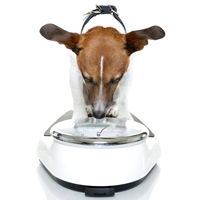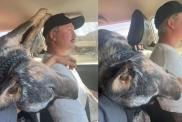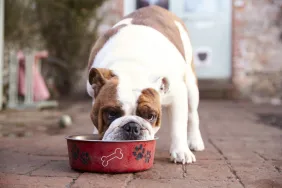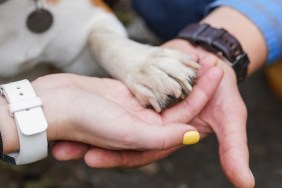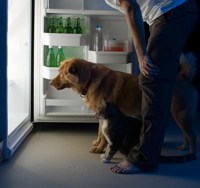It looks like America’s obesity epidemic has gone to the dogs. If your pooch is showing a little extra “pooch” around his midsection, chances are he’s not the only one; studies now suggest that more than 50 percent of dogs in the United States are overweight or obese.
Owners might think there’s nothing more adorable than a chunky Chow Chow or a pudgy Pomeranian, but pet obesity is no laughing matter. Extra pounds can put a strain on a dog’s joints, liver, kidneys, lungs, and hearts, resulting in a lower quality of life and shortened lifespan.
While there are certain hormonal disorders and breed predispositions that can lead to obesity in dogs, Cesar Millan tells the New York Times most dogs become overweight because their owners seem to replace attention and affection with food — and lots of it. The “dog whisperer” suggests owners take their four-legged friends on walks that include physical as well as mental stimulation, where the dog must follow obedience commands in order to earn small, healthy treats.
“Dogs today have butlers and maids,” Millan explains. “They don’t hunt for their food anymore, but they should work for food.”
Obesity in owned dogs is dangerous enough, but the problem can be especially dire for shelter pets who are often living on borrowed time at overcrowded, underfunded facilities. Many rescue organizations and animal shelters have found that overweight or obese dogs are among the hardest pets to place, even going to far as to deem portly pooches unadoptable.
Take Butters, for example. The now 5-year-old Labrador Retriever had everything going for him on paper — popular breed, a pleasant temperament, and a fun-loving personality. Staff at the Indigo Ranch, a dog boarding and pet adoption organization in Vernonia, Ore., should have felt confident in Butters’s ability to find a forever home in a short time.
But at a whopping 142 pounds, Butters’s health was failing him, and families looking to adopt a new dog from the ranch consistently passed the bulky Lab by. The director of Indigo Ranch, Heather Hines, says Butters had spent quite some time in a county shelter and was about to be euthanized because of his weight problem before coming to her rescue.
“He was a friendly, wonderful dog, but he was huge, his coat was greasy, and he had to lie down to eat his food,” Hines says of the formerly chunky Butters.
Hines had to do something to save this sweet but dangerously obese dog. She started first by working on correcting the large Lab’s diet — cutting out carbohydrates, feeding lean proteins, and moderating his portions—and then started Butters on a safe exercise regiment. Five months after coming to the Indigo Ranch, Butters had slimmed down to a healthy 84 pounds. Now vibrant and active, Butters was quickly adopted by Paige Reed’s family.
“He didn’t know he could run or jump until he lost the weight,” Reed says of the now-svelte Butters. “Now he’s athletic, loves playing with us and with other dogs.”
But the dog’s struggle to get back to health and find a new home could have been avoided if he’d been on the proper diet and had enough physical activity to begin with, Hines says. In fact, the seasoned rescuer explains that she has overheard some pretty telling tidbits from owners of overweight and obese dogs over the years.
“People think it’s funny or cute when their dog is fat,” she explains. “One woman told me she saw her husband feeding Häagen-Dazs leftovers to her dog.”
Calabash, North Carolina veterinarian and founder of the Association for Pet Obesity Prevention, Dr. Ernie Ward, the one causing a pet’s obesity is usually the one controlling that pet’s access to food and exercise — the pet owner.
“This is a human problem,” Dr. Ward explains. “No pet is making a sandwich and eating a bowl of ice cream at midnight.”
What’s worse, Dr. Ward says, is that many pet parents seem to be in denial.
“The disconnect between reality and what a pet parent thinks is obese makes having a conversation with their veterinarian more challenging,” he adds. “Many pet owners are shocked when their veterinarian informs them their pet needs to lose weight. They just don’t see it.”
If you suspect your pet might be overweight, first make an appointment with your veterinarian. Be honest about your dog’s eating habits and his activity level. After a quick physical exam and some blood tests, the vet can then work with you to develop a safe and healthy weight loss plan for your pet.
Sources: PetObesityPrevention.com, NYTimes.com, Indigo Ranch
